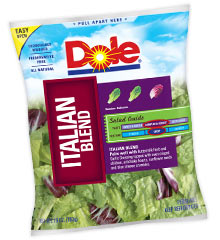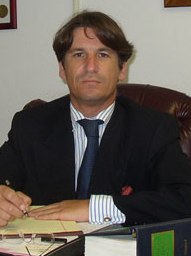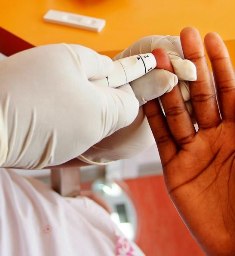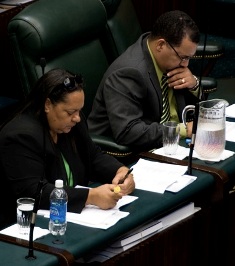Archive for June 23rd, 2011

Salad recalled over risk of food poisoning
 (CNS): As a result of a recall by Dole Fresh Vegetables of around 2,880 cases of salad due to a possible health risk from the bacteria Listeria monocytogenes, local supermarket Foster's Food Fair is notifying the public to remove all Dole Italian Blend Salads with UPC number 000 71430 00819 “Best By Date” 19 June from their homes. Although the date has passed the supermarket management said it was still warning consumers because at times people may not always look at expiration dates. “We are urging the public that if they do have this product check it before using,” Foster’s said Thursday afternoon.
(CNS): As a result of a recall by Dole Fresh Vegetables of around 2,880 cases of salad due to a possible health risk from the bacteria Listeria monocytogenes, local supermarket Foster's Food Fair is notifying the public to remove all Dole Italian Blend Salads with UPC number 000 71430 00819 “Best By Date” 19 June from their homes. Although the date has passed the supermarket management said it was still warning consumers because at times people may not always look at expiration dates. “We are urging the public that if they do have this product check it before using,” Foster’s said Thursday afternoon.
The Product Code and Use-by Date are in the upper right-hand corner of the package; the UPC code is on the back of the package, below the barcode.
No illnesses have been reported in association with the recall. This precautionary recall notification is being issued due to an isolated instance in which one package of Dole Italian Blend salad yielded a positive result for Listeria monocytogenes in a random sample test collected and conducted by the Ohio Department of Agriculture.
Listeria monocytogenes is a bacterium that can cause food borne illness in a person who eats a food item contaminated with it. Symptoms of infection may include fever, muscle aches, gastrointestinal symptoms such as nausea or diarrhea. If it spreads to the nervous system symptoms may include headache, stiff neck or confusion. The illness primarily impacts pregnant women and adults with weakened immune systems. Most healthy adults and children rarely become seriously ill.
We encourage all customers who have purchased this product to return the affected product to their Foster’s Food Fair IGA of purchase for a full refund.
The Product Codes are 0049A157201A, 0049A157201B, 0049A157202A, 0049A157202B, 0686A157202A, 0686A157202B

New judge appointed to Grand Court bench
 (CNS): The Cayman Islands Grand Court finally has a new permanent judge. Governor Duncan Taylor announced that Justice Richard Williams will take up his post on 12 September, having been appointed on the advice of the Judicial and Legal Services Commission. This is the first time that a local judge has been appointed via the new commission, which was established in the 2009 constitution. The position was filled after an open recruitment process advertised both locally and overseas. Following the short-listing, an interview panel of four members of the JLSC and the chief justice interviewed six people for the job. The panel was unanimous in its view that the qualifications, experience and skills of Justice Williams made him the strongest candidate.
(CNS): The Cayman Islands Grand Court finally has a new permanent judge. Governor Duncan Taylor announced that Justice Richard Williams will take up his post on 12 September, having been appointed on the advice of the Judicial and Legal Services Commission. This is the first time that a local judge has been appointed via the new commission, which was established in the 2009 constitution. The position was filled after an open recruitment process advertised both locally and overseas. Following the short-listing, an interview panel of four members of the JLSC and the chief justice interviewed six people for the job. The panel was unanimous in its view that the qualifications, experience and skills of Justice Williams made him the strongest candidate.
There has been a vacancy on the Grand Court Bench since the former Justice Priya Levers was removed last year following the decision of the UK’s Privy Council based on the findings of tribunal that was held in the Cayman Islands in May 2009.
Since then the courts have been depending on a team of visiting temporary judges from around the region, who have been helping with the growing workload of the courts system.
Justice Williams is currently a Puisne Judge in the Turks and Caicos Supreme Court, a post he has held since May 2008. Since his appointment, he has sat as the judge in the Island of Providenciales, which is the most populous and prosperous of the Turks & Caicos Islands, and it is where most of the businesses and hotels are situated.
Prior to this he served as Chief Magistrate for four years after having served as Resident Magistrate for Providenciales for two years. Justice Williams also gained Magistracy experience previously as Senior Magistrate and Acting President of the Family Court in St Vincent and the Grenadines.
He was called to the Bar in England and Wales in 1988 and spent most of his early legal career practising as a Barrister specialising in all areas of family law. Before taking up his first judicial post he was admitted and practised as a litigation attorney in the Turks and Caicos Islands.
His ten years on the bench have given him a wealth of experience in dealing with criminal, civil, family and coroner inquest matters.

NDC calls for community support of campaign
 (CNS): The National Drug Council (NDC) is encouraging the whole community to get involved in helping to inspire everyone to act against drug misuse. This Sunday the NDC will mark the United Nations’ International Day against Drug Abuse and Illicit Trafficking to raise awareness about the major challenge that drugs represent to society as a whole, and especially to the young. “Preventing or delaying use of psychoactive drugs, alcohol, and tobacco among adolescents is a critical national public health goal. The simplest and most cost-effective way to lower the human and societal costs of drug abuse is to prevent it in the first place”, said Joan West-Dacres Executive Director of the NDC.
(CNS): The National Drug Council (NDC) is encouraging the whole community to get involved in helping to inspire everyone to act against drug misuse. This Sunday the NDC will mark the United Nations’ International Day against Drug Abuse and Illicit Trafficking to raise awareness about the major challenge that drugs represent to society as a whole, and especially to the young. “Preventing or delaying use of psychoactive drugs, alcohol, and tobacco among adolescents is a critical national public health goal. The simplest and most cost-effective way to lower the human and societal costs of drug abuse is to prevent it in the first place”, said Joan West-Dacres Executive Director of the NDC.
This years’ theme is “Your life. Your community. No Place for Drugs”.
The NDC is calling on individuals, non-profit organisations, government and the private sector to get involved by organising office events, spreading the word through networks and contacts and using the campaign slogan and logo in promotional products, websites and social media.
More than 50% of students in the Cayman Islands do not use illegal drugs (CISDUS 2010). Many people who once used illegal drugs have now rejected them; many suffered as a result of drug abuse. Accidents, addiction, criminal involvement, damaged relationships, impaired judgment, and lost educational or employment opportunities were common. Of those people who currently use illegal drugs, some are chronic abusers. Preventing Cayman's 6000 plus children from using drugs, alcohol, and tobacco will help safeguard our society, the NDC said.
“Preventing drug abuse is one of the best investments we can make in our country's future”, stated Simon Miller, Prevention Officer. Doing so is preferable to dealing with the consequences of drug abuse through law enforcement or drug treatment. “Prevention is most promising when it is directed at impressionable youngsters.”
Adolescents are most susceptible to the allure of illicit drugs. Delaying or preventing the first use of illegal drugs, alcohol, and tobacco is essential. Prevention programmes are not vaccinations that inoculate children against substance abuse. Sadly, significant numbers of young people who participate in the best programmes will go on to use drugs. The "no-use" message must be reinforced consistently by parents, teachers, coaches, mentors, and other care givers.
The National Drug Council‘s scientific research continues to play a major role in informing many local bodies on issues of substance abuse misuse through its Cayman Islands Student Drug Use Survey (CISDUS).
The UNDCO’s 2011 campaign seeks to mobilise support and inspire people to act against drug use. Therefore, the National Drug Council encourages everyone to spread the message “No Place for Drugs”.
According to the latest UN drug report published Thursday many illicit drug markets have reached global dimensions. While global markets for cocaine, heroin and cannabis have declined or remained stable, the production and abuse of prescription opioid drugs and new synthetic drugs is rising the World Drug report reveals. Globally, some 210 million people, or 4.8% of the population aged 15-64, took illicit substances at least once in the previous year. Overall drug use, including problem drug use, remains stable but demand soared for substances not under international control, such as piperazine and cathinone. The effects of cannabis are also being mimicked by synthetic cannabinoids, or "spice".
Cannabis remains by far the most widely produced and consumed illicit substance globally, although data on cannabis are limited. In 2009, between 2.8 per cent and 4.5 per cent of the world population aged 15-64 – between 125 and 203 million people – had used cannabis at least once in the past year.
While cannabis herb (marijuana) production is widespread, notably in the Americas and Africa, cannabis resin production (hashish) continues to be concentratedin just two countries: Morocco, supplying the West European and North African markets, and Afghanistan supplying the markets in South-West Asia.
For information on the local call NDC on 949-9000, Fax. 949-6264, email: info@ndc.ky or visit www.ndc.ky
See Global drug report here

China Harbor Engineering Co in bribery scandal
(SeattlePI): A Bangladesh court Thursday sentenced the fugitive son of former Prime Minister Khaleda Zia to six years in jail for laundering money taken as bribes from two global companies. Judge Mohammad Mozammel Hossain said in his verdict Arafat Rahman was guilty of smuggling more than 200 million takas ($2.66 million) to Singapore. The judge also fined Rahman 190 million takas ($2.53 million) and asked authorities to get the smuggled money returned. Rahman, the younger son of Zia, was accused of taking bribes from China Harbor Engineering Company Ltd. and the Bangladesh subsidiary of Germany's industrial giant Siemens AG for helping them win government contracts during his mother's 2001-2006 premiership.

Community urged to take up free HIV test
 (CNS): The Cayman public is being encouraged to take advantage of free HIV testing next week during the Health Services Authority (HSA), the Cayman AIDS Foundation and the Red Cross local campaign. This year HIV Testing week runs from Monday, 27 June to Friday, 1 July and coincides with international HIV testing days around the world. All efforts are geared towards supporting people to voluntarily seek HIV testing and counselling with this year’s theme being Take the Test, Take Control – Be > than AIDS. The campaigns encourage all to play their part in halting the HIV/ AIDS epidemic by being aware of one’s HIV status and to practice safe sex.
(CNS): The Cayman public is being encouraged to take advantage of free HIV testing next week during the Health Services Authority (HSA), the Cayman AIDS Foundation and the Red Cross local campaign. This year HIV Testing week runs from Monday, 27 June to Friday, 1 July and coincides with international HIV testing days around the world. All efforts are geared towards supporting people to voluntarily seek HIV testing and counselling with this year’s theme being Take the Test, Take Control – Be > than AIDS. The campaigns encourage all to play their part in halting the HIV/ AIDS epidemic by being aware of one’s HIV status and to practice safe sex.
Health minister Mark Scotland asked residents to take the test, know their status, and take control. “Even after 30 years of education and prevention efforts, HIV continues to be a critical issue throughout the world; one of which we are not exempt,” Scotland stated. “Fortunately, we can do something: Get tested for HIV; practice safe sex; talk about HIV with family, friends and colleagues, support people living with HIV and AIDS and get involved with the National HIV Testing Week in your community”.
He said knowing your status can make a difference.
“Some people who have HIV are not even aware of it. But those individuals who do know are living longer, better quality lives due to the treatments they receive. Knowing your status means taking control and being responsible for your own health.”
HSA HIV/AIDS Program Coordinator Pauline Ffrench echoed the importance of minimizing the risk and stopping the spread of HIV. “In principle, everyone who is old enough for sexual activity is at risk for becoming infected with HIV. The best way to reduce your risk of becoming infected with HIV is to avoid risk taking behaviours that give the virus a chance to spread from someone else to you. The main behaviour change should be to prevent all unsafe sexual practices and engage in faithful relationships,” she added.
Free HIV testing will be available from 9 a.m. to 2 p.m. at all district health centres on Grand Cayman, at the George Town General Practice Clinic, Public Health Clinic , Faith Hospital on Cayman Brac, and the Little Cayman Clinic by appointment.
The testing procedure involves a quick and simple blood test. No appointment is necessary at the larger clinics and the waiting time for testing is usually no more than ten minutes. Persons who are seeking testing or counselling need to indicate to the registration clerksthat they would like to register for free HIV screening.
The results will be available in three working days and will be given to the patient only, who must return to the clinic where the test was taken to get the results. This is to protect the confidentiality of the individual and to offer counselling.
For more information about HIV testing week, Contact HIV AIDS programme coordinator Pauline Ffrench at 244- 2631 or Laura Whitefield at 244 2507.
Bank show cases the value of art
(CNS): The latest artist to adorn the walls of Butterfield is Kaitlyn Elphinstone. The exhibition ‘Vertebytes’ is curated by well-known local artist David Bridgeman and opens on 1 July to customers and the public and runs until November at the Butterfield Hall of Art, located on the second floor of Butterfield’s flagship building, Butterfield Place — a public space dedicated to featuring the artworks of emerging artists. With a background in Visual Studies and Art History from the University of Toronto, Kaitlyn’s work is conceptually grounded. “The formal setting and urban landscape of Toronto allowed me to refine my visual and conceptual vocabulary, a vocabulary that emerged through a focus on the intersection between natural and man-made constructs,” she said about her work.
Kaitlyn has recently returned to Cayman after completing an MA in Arts Policy and Management at Birkbeck, University of London.
The exhibition Vertebytes examines life instances through a series of fifteen digitally constructed images. The images and exhibition layout explores everyday occurrences though various themes such as the concept of time, our understanding of process, our experience of rhythm, movement and repetition.
Constructed from the original work “Vertebytes” currently on display at the National Gallery of the Cayman Islands, the exhibition remains consistent with Kaitlyn’s process-intensive approach. The image stills have been derived from video, then digitally constructed to suspend animated instances into single visual images. The process was initiated by an exploration into the disparities between human and digital capacities in evoking life instances or memories.
“The Butterfield Hall of Art is the perfect place for emerging artists to experience their first solo exhibition, as the space provides great exposure for new artists on a daily basis,” said David Bridgeman. “It is important for all artists to exhibit, not only for the commercial aspect but, in my opinion and more importantly, to reflect on the work that has been done.”

Legislators plough through appropriations
 (CNS): Disparity in weather forecasts, falling stamp sales, problems with farmer’s ID cards and the proposed traffic law were just some of the issues that the country’s legislative members were discussing on Wednesday as Finance Committee continued its work approving spending for the Ministry of District Administration, Works, Lands and Agriculture. The minister revealed that the traffic law would be coming to the Legislative Assembly in September, that public works was not expecting a surge in medical waste during this financial year in relation to the proposed Dr Shetty plant, and that the dump’s current tyre shredder was not capable of turning the rubber into mulch. (Photo Dennie Warren Jr)
(CNS): Disparity in weather forecasts, falling stamp sales, problems with farmer’s ID cards and the proposed traffic law were just some of the issues that the country’s legislative members were discussing on Wednesday as Finance Committee continued its work approving spending for the Ministry of District Administration, Works, Lands and Agriculture. The minister revealed that the traffic law would be coming to the Legislative Assembly in September, that public works was not expecting a surge in medical waste during this financial year in relation to the proposed Dr Shetty plant, and that the dump’s current tyre shredder was not capable of turning the rubber into mulch. (Photo Dennie Warren Jr)
Few details about the capping and relocation of the landfill emerged, however, when the MLAs voted $3.6 milllion for waste collection services. The increase in the cost of managing government properties from $11.4 million to $15.7 million was said to be mostly as a result of the new Government Office Accommodation building, and the increase in revenue from government to the national mail service by some $300,000 was down to a decline in stamp sales which is where the bulk of the post offices revenue comes from.
During Finance Committee all member of the assembly get to ask questions and grill ministers, chief officers and managers of various government departments about their budget allocations. It is also an opportunity for the members to raise any problems their constituents may have with government services and departments. Farmers ID cards, electrical problems at the North Side civic centre and tide forecasts by the weather services were just some of the issues members were questioning onbehalf of their constituents.
In order to complete the work this week members are sitting late into the night to scrutinize the budget appropriations which are now available here.
The main document setting out government spending is also here

Oil refinery experimental
 (CNS): The claims of the company planning to bring an oil refinery to the Cayman Islands of an emission free plant are not founded on a working example, the opposition and the independent member have noted. So far the technology being proposed has never been used at an oil plant before but on coal power energy plants. Mario Rankin, one of the founders of Navitas Ltd which has proposed the project, says that he firm will be offering CUC the technology to clean its stacks but has admitted that so far it has not been used on a refinery. The goal of the developers is to merge two technologies, which involves a modern compact plant with the emissions cleaning technology to refine crude here in Cayman and supplycheaper oil.
(CNS): The claims of the company planning to bring an oil refinery to the Cayman Islands of an emission free plant are not founded on a working example, the opposition and the independent member have noted. So far the technology being proposed has never been used at an oil plant before but on coal power energy plants. Mario Rankin, one of the founders of Navitas Ltd which has proposed the project, says that he firm will be offering CUC the technology to clean its stacks but has admitted that so far it has not been used on a refinery. The goal of the developers is to merge two technologies, which involves a modern compact plant with the emissions cleaning technology to refine crude here in Cayman and supplycheaper oil.
Arden McLean, the opposition member for East End who says he is very familiar with oil refining, says he finds it very hard to believe that any technology could clean up the sludge, dirt, toxins, noxious gases, the carcinogens and smell associated with the process of refining oil.
“If the technology exists why isn’t it being used already in the United States?” Mclean said when he spoke to CNS this week about his concerns over the proposal. “It sounds like this will bea prototype.”
The PPM member also said he had concerns that the pig-system proposed for cleaning the CUC pipe so that both crude and refined products can pass through the same pipe would not be ideal as the existing pipe has too many bends and valves for it to be effective. McLean said there were for too many questions regarding the proposal that had not been answered, not least how the product could be made that was cheaper in the end as crude oil is the same price the world over.
Ezzard Miler, the North Side representative, stated that he too had concerns about the claim that it was emissions free, although the technology was not in use anywhere on an oil refinery. He said he believed it was a chemically assisted process that supposedly removes the emissions but he could not see how it was going to work and said the risks of such experimental technology would outweigh any possible benefits.
“What will we do if it goes wrong and it turns out to be an even greater pollutant?” he asked. “The information the public has is merely unsubstantiated ‘verbaciousness’ and they can’t show how the proposed technology is going to work.”
He also questioned the costs and said the economies of scale for refining were unlikely to ensure cheaper fuel. Miller wondered how the oil refinery fitted in with the government’s goal to reduce its dependence on fossil fuel, which he said was supposed to be part of the National Energy Policy that government has apparently been working on for the last two years.
The North Side member said the country needed to look at real and appropriate alternatives. He said government could encourage the development of solar power through reductions in duty, even if that started on a small domestic scale. “We need to be reducing our carbon footprint, not increasing it,” he added.
Rankin has said that the proposed refinery, which will be located in the industrial area not far from CUC, would be a compact state-of-the art facility which uses special filters to completely remove all the emissions, leaving only CO2, which can be diverted into greenhouses for agricultural purposes. He said it bears no resemblance to the common image of a refinery and produces much cheaper fuel for everyone.
However, he has admitted that the technologies have not yet come together and noted that there were risks involved with the filters where the toxins end up after the emissions cleaning process and these would have to be exported.
Speaking to CNS earlier this year, the people involved in the process said that how the filters would be exported and where to had not been clarified. CNS also submitted a number of questions about the refinery and how the emissions process worked in March but we are still awaiting answers to the questions.

Anti-crime tsar to take lead
 (CNS): Government has finally revealed the long awaited crime reduction strategy document, which was prepare by the National Security Council (NSC) to set out a long term plan to tackle the country’s growing crime issues. The document says that rehabilitation and early intervention will be the main points of focus with an inter-agency approach that will require a new oversight post. The governor revealed that an anti-crime boss will be appointed to the Cabinet Office to oversee and coordinate the plan and ensure accountability, which has been lacking in the past, in implementing the recommendations in the strategy. A job description has been drawn up and the recruitment process will be underway shortly, Duncan Taylor said.
(CNS): Government has finally revealed the long awaited crime reduction strategy document, which was prepare by the National Security Council (NSC) to set out a long term plan to tackle the country’s growing crime issues. The document says that rehabilitation and early intervention will be the main points of focus with an inter-agency approach that will require a new oversight post. The governor revealed that an anti-crime boss will be appointed to the Cabinet Office to oversee and coordinate the plan and ensure accountability, which has been lacking in the past, in implementing the recommendations in the strategy. A job description has been drawn up and the recruitment process will be underway shortly, Duncan Taylor said.
Launching the document (posted below) at a briefing with the premier and other members of the security council on Wednesday morning, the governor said the new post was an innovative one as it was the first time that a leadership post in government would co-ordinate with and pull resources from all of the ministries and portfolios.
Taylor said that one of the main criticisms that the working group, which drew up the crime prevention strategy, found during its research was that communication between ministries was poor. While much work has been done in the past to try and intervene and address crime there has been poor co-ordination and poor mechanisms for measuring success.
He said that government agencies have, up until now, been measuring outputs and not outcomes but under focused leadership things could improve.
The new document does not present a quick fix, government officials said, but is designed to address the causes of crime. The premier said it dealt with a lot of social matters and what he liked about it was the intervention element to stop young people from reaching the point where they were getting involved in crime. He said the strategy called for cooperation and partnerships and was necessary as it was costing the public person $56,000 per year for each and every prisoner at Northward Prison.
The document reveals that government has been funding at least 130 different programmes that relate to crime prevention but there was no way of measuring if anything worked and resources are being spread across too many agencies, too thinly.
“There is little coordination between agencies; there are no real performance measures in place; and there is very little evaluation of success or failure of the programmes,” the strategy reveals in its executive summary.
The working group also struggled to get information from the relevant managers, despite several letters from the governor to the chief officers. “Most agencies have not supplied the performance indicators of their various programmes or their success rate,” the writers revealed. “Given the total lack of information submitted on project evaluation, it was impossible to assess how effective the individual programmes are.”
Other shortcomings found by the working group included the fact that there is no drug or alcohol counselling or rehabilitation in the prison and no aftercare help or support for prisoners to stay away from drugs when released, despite the fact of that more than 70% of prisoners have substance abuse issues. Nor, the authors said, is there a mandated syllabus for drug education in schools.
“It is apparent from surveys carried out by the NDC that experimentation with drugs is taking place at an early age. Furthermore, studies show that drugs play a significant role in a number of crimes committed in the Cayman Islands. Despite this there is no consistent integrated syllabus of drugs education within schools,” the report states.
The numerous programmes with no measure of success, the gaps in many other areas in particular in relation to rehabilitation, the failure of agencies and departments to communicate and the lack of accountability all point to the need for strong leadership, the report finds, stating that the NSCl members were in favour of the oversight role. The goal is for the new anti-crime tsar to direct government funds for programmes that directly or indirectly help to reduce crime.
The report stated that a tsar figure was needed with “the necessary clout” and to be accountable, “with clear objectives and cross-departmental responsibilities” to ensure value for money.
The working group has recommended that the established post of Director Policy Co-ordination Unit in the Cabinet Office be filled partly for this purpose but also for other cross departmental initiatives. A draft job description has now been agreed on by the Cabinet Secretary and the Portfolio of Internal and External Affairs.